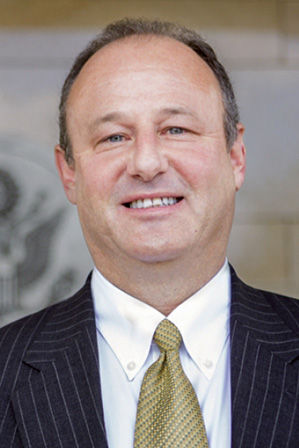Restoring a Culture of Respect, Starting with the Iran Hostages
President’s Views
BY ERIC RUBIN

We have much to be proud of as a Service: not only our legacy of dedication, sacrifice and accomplishment, but also our more recent achievements leading on the COVID-19 repatriation efforts and the evacuation of more than 120,000 from Afghanistan.
There is also a lot that needs fixing, including the standard we uphold for decency and respect among and toward professional colleagues.
We have too many examples of callous, overly bureaucratic treatment of members of the Foreign Service in their hour of need. We have seen this poor treatment at play for decades in the aftermath of terrorist attacks that killed and wounded FS members and local staff.
I was personally involved in trying to fix the mistakes State made in responding to survivors and bereaved family members after the 1998 Al-Qaida attacks on U.S. Embassy Nairobi and U.S. Embassy Dar es Salaam. Survivors and bereaved were treated shabbily, and with a real lack of compassion. And I know that they continue to suffer such neglect to this day, as former U.S. Ambassador to Kenya Prudence Bushnell wrote in her compelling book, Terrorism, Betrayal, and Resilience: My Story of the 1998 U.S. Embassy Bombings.
As concerning is the way we have failed to keep faith with the 53 Embassy Tehran hostages. The events of 1979 are seared into the memories of all of us who were alive at that time. In my case, they helped motivate my decision to apply for the Foreign Service four years later.
In February 1979, the U.S. drew down Embassy Tehran after it was overrun by militants. Later that year, the U.S. determined it was important to boost staffing again and requested volunteers to do so. Members of the Foreign Service stepped up.
Months later, the Carter administration allowed the shah into the U.S. for medical treatment, and that decision led directly to the hostage crisis.
The Iran hostages and their families suffered every indignity imaginable, not just at the hands of their Iranian captors, but from our own bureaucracy. Among other things, State cut off their health insurance and employee benefits on the grounds that they were AWOL, while in captivity! (Thankfully, that appalling decision was quickly reversed under scathing public criticism.)
While in captivity, the hostages suffered torture and mistreatment because they represented the United States. And the personal and psychological impact has been endured by the hostages and their immediate family members for the 42 years since.
In the Algiers Accords that Deputy Secretary of State Warren Christopher negotiated to free the hostages, the U.S. waived claims against Iran in most cases. It has taken decades for that decision to be reconsidered.
Compensation legislation enacted by Congress in December 2015 provided for $220 million to be paid to surviving hostages, spouses and children. Because the payments must be funded by successful claims against foreign governments, only a fraction of the promised compensation has been paid.
If nothing changes, the compensation will not be fully paid until 2039 at the earliest—by which point none of the hostages and their spouses are likely to still be alive.
That cannot be the right answer. Forty-two years after their captivity and mistreatment, our retired colleagues and their survivors have not been adequately compensated for the suffering they endured while serving our country.
Yellow ribbons are scant comfort to those who continue to bear the scars of their ordeal, both literally and figuratively. This sad tale is emblematic of our failure as a nation to truly honor those who have sacrificed for us.
It is time to do right by the hostages of Embassy Tehran and pay them what they are owed. We must not only because they deserve what they have been promised, but also because we need to make a statement going forward that we will take care of our people. The time to start is now.

